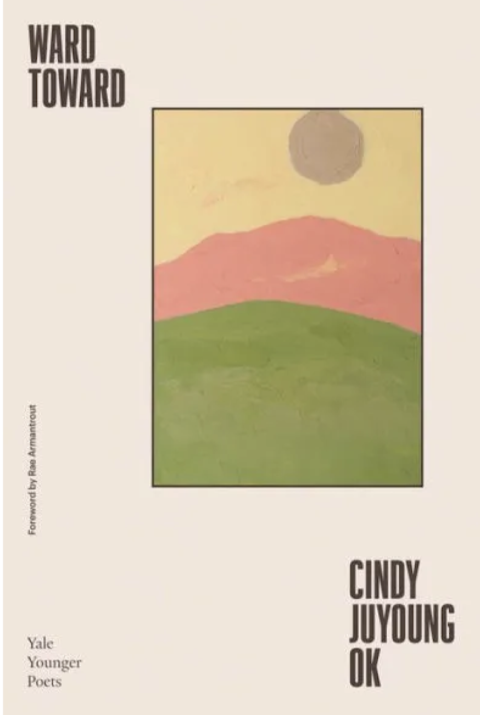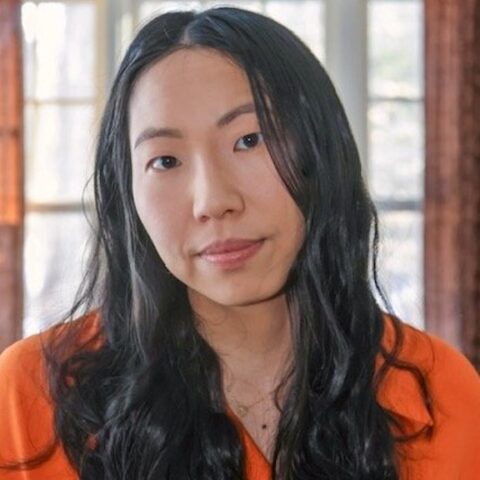“You cannot refuse language’s constant renewals by claiming nonparticipation,” Cindy Juyoung Ok recently told Poets & Writers Magazine. “The meaning of all words is socially determined, and their users are a part of, and responsible for, their changing possibilities.” The poet participates in this renewal of language in her debut full-length collection, Ward Toward, chosen for the 2023 Yale Younger Poets Prize by Rae Armantrout.
As the title suggests, the term “ward” is a cipher for this collection of poems which uses the term’s various meanings to tell a story of identity and immigration, violence and mental illness, shared trauma and lonely isolation. Ok says that the poems in Ward Toward, written between 2018 and 2022, are “constrained in the enactment of material constraint.” The poet shares her world with readers through a variety of forms, from traditional English sonnet to free verse couplets and tercets, from prose blocks to staggered lines and shape poems. Ok divided the book into three sections, or wards.
 In the early poem “Laugh Track,” Ok engages with the term “ward” as applied to mental health, combining stark vulnerability with cultural critique. A series of prose blocks over three pages includes frank confessional lines like, “I hadn’t known when people said they could not get out of bed, it was so literal. As a child, I potty trained easily and early, but at nineteen, I wet my bed twice because I couldn’t get out of it.” The speaker shares about the magnet therapy used to treat her first major depressive episode at nineteen and the episodes of the TV show Seinfeld which played while it went on. It was her first time encountering the show.
In the early poem “Laugh Track,” Ok engages with the term “ward” as applied to mental health, combining stark vulnerability with cultural critique. A series of prose blocks over three pages includes frank confessional lines like, “I hadn’t known when people said they could not get out of bed, it was so literal. As a child, I potty trained easily and early, but at nineteen, I wet my bed twice because I couldn’t get out of it.” The speaker shares about the magnet therapy used to treat her first major depressive episode at nineteen and the episodes of the TV show Seinfeld which played while it went on. It was her first time encountering the show.
As someone not watching reruns clouded by 1990s nostalgia, Ok senses the racial dynamics of Seinfeld more keenly, “Over time, there was a sense that these characters lived in a timeless space across season, perpetually amid shenanigans, skillfully keeping interactions with nonwhite guest actors under 90 seconds.” Being presented with an all-white main cast in her pastimes echoes in her experience of having only one nonwhite therapist at her psychiatric facility. Ok alludes to the perceived importance of such guests in an earlier section: “Barriers Seinfeld’s guest stars may face for us to laugh comfortably at include death, deportation, and disability, while the mess our four core characters build themselves is central, and free.”
While a ward can be a place of safety, that need for safety comes from external violence. Racist and sexist violence, and the need for safety from them, are key themes throughout the collection. Readers of Louisiana-based news or history also know that “ward” can be an administrative term for a borough or city. The speaker of “In Atlanta” a poem in nine tercets, addresses the 2021 shootings of Asian women at several of the city’s spas:
Last week I heard shooting and massage;
in the instant of hearing knew, then said,
all that had not yet been reported.
The poem recalls the casual racism of the police who are supposed to protect these women, one of whom tactlessly explained the 21-year old male shooter’s actions by saying that it was “a really bad day for him, and this is what he did.” The poem ends with a sarcastic play on those words:
Every mother knows
that any child’s long life is a sustained
surrender — the math of one man’s really
bad day, our millions of hearts buried.
The speaker in the poem “Ward of One” conveys the isolation inherent in being a domestic violence survivor. Ok brings the reader into the poem succinctly in the first line, “Confined by a lease with a beloved man,” as the poem of unmetered tercets begins. We hear how the unnamed man has sworn repeatedly that he was only pointing at her with a kitchen knife, not threatening to stab. The speaker makes clear the problem with these types of rationalizations when she’s stuck living with an abuser, again employing the administrative meaning of “ward”:
my body became
a district of our home, calculating his
gestures and wondering if the signs
would match their means.
Ok paints a visceral portrait of domestic violence complaints, and the excuses often used to minimize such instances in the following lines:
Later he explained
his fists had been for emphasis and would
never have been laid; he laughed, saying
the number twelve thousand, my ransom,
was random, and he was sorry — impossible
Ambiguity of language is a theme throughout the collection, with certain poems intended to be read in multiple ways. Ok mines her own experience with psychiatric wards, and her ambivalent feelings about them, in “The Orders.” The poem may be read straight through as a series of 11 quatrains, but the lines are numbered and the text fragmented, so that they can also be read as four 11-line stanzas. The care taken can be seen from the opening of each method, beginning:
1. the only way out is all the way through
2. workbooks, each ending with a ☺ so big
3. it takes up a whole page of presentation
4. on acceptability of the standard: I play
1. quiet games they ask me to, changing
2. and wide, accept diagnoses, and I write
3. in my narrow notebook to list visitors,
4. conversations, books, hoping to escape
The rational steps displayed in the first two stanzas take on a frenetic feeling – one I’m familiar with from my own bouts with chronic mental illness – when reading only the first line of the first seven stanzas:
1. the only way out is all the way through
1. quiet games they ask me to, changing
1. the rules, smiling to the hierarchy top:
1. my courtyard privilege (CYP), a daily
1. reminding that we do not have rights
1. but privilege, to feel rain on our skin or
1. to eat a second sandwich,
An an example of her variety of form, the poem “Composition of a Raft” is likewise meant to be read in multiple ways, but takes the first of eight quatrains in two columns. The poem, written in 2018, was inspired by the author’s visit to Ramallah, Palestine, another administrative ward, to protest Israeli occupation. The first horizontal row reads:
It was the longest loss [] of the moonview
for a century that summer— [] we spent the dream
putting everyone back [] in their places
and avoiding spectacle, [] by refusing to play
spectator, resisting [] the humiliation
in pieces
When we read the poem vertically, the words take on a new resonance, suggesting the act of warding off danger: “It was the longest loss / for a century that summer– / putting everyone back / and avoiding spectacle, / spectator, resisting / in pieces.”
 Ok’s formal creativity may also be seen in poems arranged for effect to resemble divided countries or furniture in hospice wards. The poem “Before the DMZ” takes the shape of the two halves of the Korean peninsula, two prose sections separated by a 38th parallel white space. Ok uses this shape to address familial concerns brought on by America’s Korean War. In the section shaped like the north, the speaker addresses the unpleasant realities that arose during her ancestors migration for a better life: “That winter her father revealed he left behind a first wife, two kids, north before the war, the news unremarkable because For us, everybody had somebody they —“ The final words left unsaid. Left? Lost? Maybe abandoned? These are the types of ambiguities that arise during troubled times. Ok’s speaker wishes for a less fraught country in the poem’s lower section: “The countries are linked by land — mostly, I know, by an area covered in stone. I imagine jade-colored water between them, a wide, boring ocean on the thirty eighth parallel.”
Ok’s formal creativity may also be seen in poems arranged for effect to resemble divided countries or furniture in hospice wards. The poem “Before the DMZ” takes the shape of the two halves of the Korean peninsula, two prose sections separated by a 38th parallel white space. Ok uses this shape to address familial concerns brought on by America’s Korean War. In the section shaped like the north, the speaker addresses the unpleasant realities that arose during her ancestors migration for a better life: “That winter her father revealed he left behind a first wife, two kids, north before the war, the news unremarkable because For us, everybody had somebody they —“ The final words left unsaid. Left? Lost? Maybe abandoned? These are the types of ambiguities that arise during troubled times. Ok’s speaker wishes for a less fraught country in the poem’s lower section: “The countries are linked by land — mostly, I know, by an area covered in stone. I imagine jade-colored water between them, a wide, boring ocean on the thirty eighth parallel.”
Two poems titled “Home Ward” in the book’s third section appear in quatrains arranged on the page in a way that resembles beds in a hospital ward. Both poems have epigraphs indicating their setting, the first being “Seoul, South Korea, 2012” with stanzas arranged in orderly fashion with the final two stanzas turned ninety degrees:
In months he would be
dead in every way, but I
would not fly out, because
of my school schedule, the
cost of travel. Across the
northern border his other
descendants picture him
at thirty, father, frozen.
The poem seems to refer to the death of her grandfather, revealed in a previous poem to have left another family in North Korea when he fled south. The second poem’s epigraph is “Koreatown, Los Angeles, 2021” with much less orderly text, some bunched together, other lines snaking around stanzas. The poem, set during the pandemic, appears more chaotic, lines expressing frustration with the male relative’s level of care:
Morphine would dull his
ability to cough up his phlegm, they
said; his livelihood depended on his
constant discomfort. But it was not
hours, but weeks. He died alone …
Ok uses erasure poetry techniques in the notes from 10 therapy sessions to create the two poems titled “Ten Sessions.” After first showing, the words scattered on the page over 10 sections, the erasures substituted with white space, she rewrites the words into a lineated, visceral poem:
Client reported that she is severe
help. Over her call, violence
hotline ashamed in position
on eggshells. A remorse for health
strongly discouraged about being
violently receptive. She agreed
911 should stay in bed
with safety plan, not willing
to police nor willing to friend.
Access is trying. Names called hotlines
with reluctance to leave this
week. Tend calm to enrage further,
to engage: she keeps for it is time
to leave. Client, make sense.
She confronts vows in effort
patterns, distressed by decision
and embarrassed to remember.
Ward Toward impresses with its depth of feeling, range of meaning, and verbal dexterity. Although this style of poetry, focusing on language at a deeper level, won’t appeal to every reader, Ok was ambitious with her full-length debut and it pays off well.
[Published by Yale University Press on March 5, 2024, 100 pages, $45.00 hardcover/$20.00 paperback]